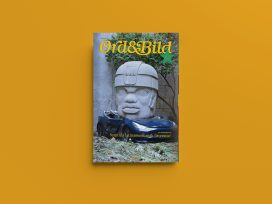
Bankrupt
Wespennest 189 (2025)
Bankruptcy in nineteenth-century parables of capitalism; billionaires, bankruptcy and the American obsession with money; and why the refusal to accept the end makes life worse.
How would you bring up a child if you took the lessons from postmodernism literally? The young Swedish writers Athena Farrokhzad and Tova Gerge present a postmodern parenting guide, a matricide or an infantile declaration of passion. Please read it biographically.
Do not pretend the child exists as a subject with any greater relevance than all the other surrounding objects with pretensions to subjectivity – be they present or absent.
Let your child incarnate whatever object you need at that moment. Every time you put its body to some new use, exclaim: “I baptise thee… (umbrella, shoehorn, broth, dialectic, etc).”
Emphasise the child’s potential mobility in the structure of desire by constantly spinning, shaking and upending the container in which it is kept, e.g. bed, buggy, baby walker and skin.
Tell your child only short, incoherent bedtime stories that do full justice to cacophony. Stroke its hair and say, “In manuals like these, if you are operating at that level, once upon a thyme there was rosemary and she was sage, she said that they said, but in free indirect discourse, so to speak, informally, you do actually need a bit of spatiality.”Remove the child from the maternal body at an early stage, to make entry into the symbolic system as bewildering as possible.
Be suspicious of all forms of progress displayed by the child and question its origin and the oppressive underlying ideology. Operate on the basis of necessity rather than meaningfulness, and encourage the child to renounce all outward distinctions such as cakes or scholarships. Do allow sweets from strangers.
Reject all active initiative and make it clear to your child that setbacks are as objectionable as successes, since setbacks are an indispensable component in maintaining the category “success”. Accuse the child of attention seeking if it achieves either terrible or impeccable academic results.
Resist the temptation to place the child in the École Normale Superieure. Do not in fact place the child in any broadly based school whatsoever.
Demand that all actions have a self-referential dimension. Remember that children do not do as you say; children do as you do. You should thus perform the following speech act: “All actions hereafter are self-referential, hence this speech act.”
Be aware of the deconstructive potential of repetition. Have teenage rebellion happen in cyclic sequences: in you, in the child, and in the dialectic.
Acquire as many parenting manuals as possible, and try to follow them all simultaneously. If they include such disparate propositions as “children need firm boundaries” and “listen to your child: it is trying to communicate”, suspect a locked order of discourse and do a cut up, with your child, of the material in question.
Beware of vaccination programmes, both for the confidence they place in modern progress, and for their hidden agenda of constructing illness with the aim of putting a premium on health.
Encourage your child in the use of narcotics, as they expand the potential of voices.
Rub your child on some carbon paper. Then cut up the paper and stick the pieces to the child’s body. Question the child as an original. Question the child as a copy. Question the carbon paper as a construction.
If your child accuses you of incomprehensibility, then accuse it of logical positivism.
Each time the child shows signs of perceiving something in the world as a category, lock yourself in the bathroom and switch off the light, so nothing is visible. Place your child in a military academy to demonstrate the consequences of absolute concepts.
Let your child become the parent, while you become the child, and both occasionally put yourselves in a third position and refuse to be either: become one another’s neighbours, for example. Network rhizomatically with your former identities.
Let your child explore different varieties of break-up, break-in and break-out, without any form of hierarchical organisation or expressed educational goal.
If the child claims to be hungry, accuse it of indulging in being-based oppression.
Put your child out onto the street and exhort it to defy arbitrary social boundaries by leading a nomadic existence. Then let your child back in and exhort it to lead a nomadic existence within the equally arbitrarily constructed boundaries of the home. Prompt a discussion of inside versus outside by flaying your child. This will also help it to discover that a human skin is much bigger than it seems, because of all the creases.
Show the child that other voices are hidden within its voices by making an incision in its vocal chords and separating the muscle fibres.
Draw attention to the child’s habit of imitating you by imitating the child.
Ensure that the child’s linguistic development is arrested at the negation stage, since lack is where desire begins, and that is what one must dwell on. Ensure the child does not learn any negations, since stemming the tide of desire facilitates the construction of pyramidal power.
Combat the metaphorical system in the child’s language acquisition process. Point to a dog and say: “Paw, woof woof, mammal”. French sound associations like “Vides, rides, petit à petit, l’oiseau fuit son nid” can also come in handy. Teach the child the language that springs up in the crack between sociolects, linguistic families and shoehorns. Help it develop a stutter by partially attaching its tongue to the roof of its mouth, with marshmallows for instance.
Play only the game of Go; never play gospel.
To minimise the impending risk that subject deconstruction will merely install a neurotic superego, which screams at such a high pitch that it cannot hear the sound of its own voice, raise the child as a dog and arm yourself with the appropriate whistle.
Render the child immune to the fetishisations of visual culture by dysfunctionalising its left eye.
Lecture your child on the decentralisation of power, on the crumbling of the centre into a domain of autonomous, cross-fertilising peripheries. Talk continuously for several years at a stretch. Punish all forms of interruption and intervention.
If your child grows up and writes any sort of text that can be interpreted as poking fun at postmodern doctrines, be sure to pay a journal handsomely to publish the piece. Matricide is an inevitable step in the development of artistic subversion.
Kill your child as soon as it comes into the world. Its siblings need something to illustrate the incomprehensible transcendence between birth and annihilation. Put it to your breast and drink its milk. Re-assimilate it into yourself bit by bit.
Execute your child with whatever firearm comes to hand. Say: “The world is my conception. You have not been shot.” Then add: “The world is your conception. Shoot me.”
Published 23 September 2008
Original in Swedish
Translated by
Sarah Death
First published by Glänta 1-2/2008
Contributed by Glänta © Athena Farrokhzad / Tova Gerge / Glänta / Eurozine
PDF/PRINTSubscribe to know what’s worth thinking about.

Bankruptcy in nineteenth-century parables of capitalism; billionaires, bankruptcy and the American obsession with money; and why the refusal to accept the end makes life worse.

Parables of violence; memories of dictatorship; perversions of memory: Ord&Bild samples contemporary Latin American literature and photography.